
Fraunhofer IMS and Arduino announce the release of AIfES, a standalone, high-efficiency, AI framework completely programmed in C, which allows innovators to train and run machine learning algorithms even on the smallest microcontrollers.
more infoWe will bring you right up to date! Our press releases regularly inform you on news from our institute. Learn interesting details about current research subjects, projects, developments as well as events and fair participation. If you have questions to our press releases or need further information, please don’t hesitate to ask. If you report on our institute, please send us a specimen copy.

Fraunhofer IMS and Arduino announce the release of AIfES, a standalone, high-efficiency, AI framework completely programmed in C, which allows innovators to train and run machine learning algorithms even on the smallest microcontrollers.
more info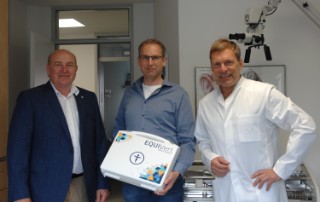
Last Wednesday, the EQUIVert team started delivering the first EQUIMedi devices. One device was personally handed over to Dr. Uso Walter for his practice. He is chairman of the board at HNOnet NRW eG, which helped develop the EQUIVert products. “I am delighted to finally hold the finished product in my hands and now be able to use it”, explains Dr. Walter.
more info
A new project with 30 participants from eight European countries will pave the way for an emerging new European business and technology ecosystem aimed at tackling various energy related challenges for the future of mobility. The project accelerates Europe's decarbonization goals for 2050.
more info
In the recently launched joint project "T-KOS" of the Research Fab Micro-electronics Germany (FMD), terahertz technology is now to be developed synergistically for industry in the fields of communication and sensor technology for the first time. Innovative system solutions in both areas can make a significant contribution to the successful implementation of future issues such as digitalization, Industry 4.0 or resource efficiency and thus strengthen Germany as a business location in the long term.
more info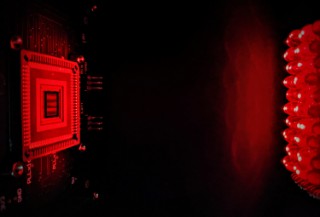
Secure encryption plays an important role in all areas of digital life in the face of rapid digitization and powerful hardware of potential attackers. Randomly generated keys form the basis and can represent a critical weak point in the case of algorithmically generated numbers. Only phenomena from the quantum world that are unpredictable in their essence can guarantee true randomness. In order to extract this quantum information from single photons, highly sensitive image sensors of Fraunhofer IMS are used and further developed as Quantum Random Number Generator (QRNG). Translated with www.DeepL.com/Translator (free version)
more info
In order to use electronics safely and reliably, it must be possible to understand where they come from, what they do and how they are constructed. Although there are currently a number of technical solutions for trustworthy electronics, there is still no consistent methodology for trustworthiness that adequately covers the entire value chain. The research project launched in March 2021 will start here.
more info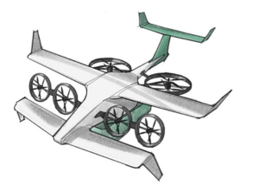
Conquering the third dimension with the ALBACOPTER lead project - Among the most powerful gliding birds is the albatross. Its terrific maneuverability and effortless hovering on air currents over thousands of kilometers are admirable. A consortium of six Fraunhofer institutes wants to take this phenomenon from nature and develop the ALBACOPTER, a flying machine that not only hovers fantastically but can also take off and land efficiently. The official kick-off meeting took place virtually on March 8, 2021.
more info
The biofeedback systems EQUIFit© and EQUIMedi© are now approved as medical products for dizziness therapy and can therefore carry the CE mark. The marketing launch is scheduled for end of 2020. The devices are the main components of the EQUIVert© solution, which researchers at the Fraunhofer Institute for Microelectronic Circuits and Systems in Duisburg developed together with colleagues from the University of Duisburg-Essen, GED Gesellschaft für Elektronik und Design mbH and Dr. Uso Walter from HNOnet NRW eG.
more info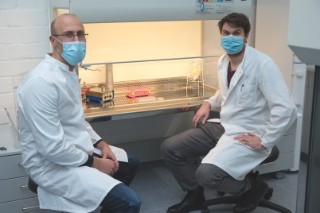
Researchers from Bochum, Göttingen, Duisburg and Cologne have developed a new method for detecting bacteria and infections. They use fluorescent nanosensors to detect pathogens faster and easier than is possible with established methods.
more info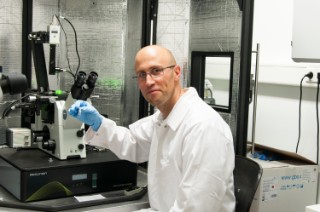
With the help of optical biosensors, bacteria and viruses could be detected in seconds. Patients would no longer have to wait days for their test results, sterile rooms, medical equipment, production processes and food could be monitored in real time. A new working group has been founded at the Fraunhofer IMS in Duisburg that wants to make all this possible.
more info